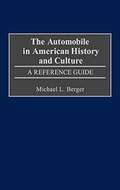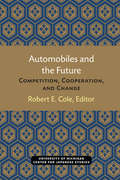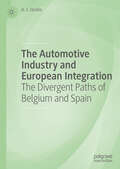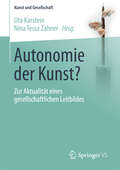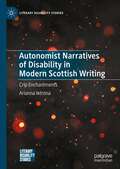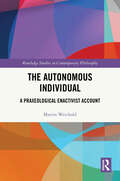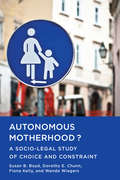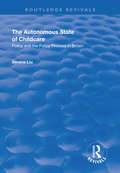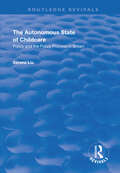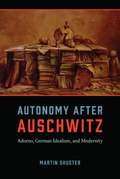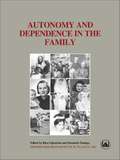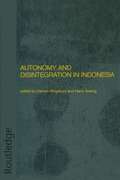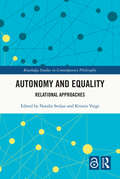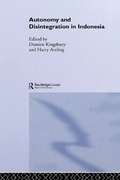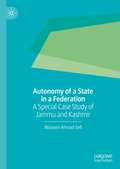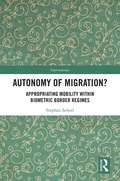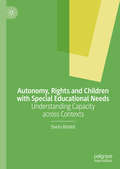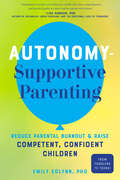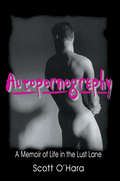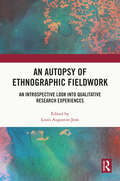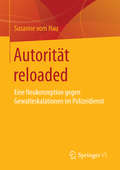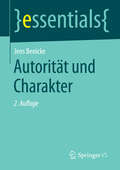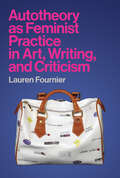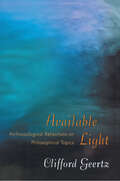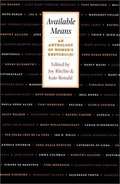- Table View
- List View
The Automobile in American History and Culture: A Reference Guide (American Popular Culture)
by Michael L. BergerThis comprehensive reference guide reviews the literature concerning the impact of the automobile on American social, economic, and political history. Covering the complete history of the automobile to date, twelve chapters of bibliographic essays describe the important works in a series of related topics and provide broad thematic contexts. This work includes general histories of the automobile, the industry it spawned and labor-management relations, as well as biographies of famous automotive personalities. Focusing on books concerned with various social aspects, chapters discuss such issues as the car's influence on family life, youth, women, the elderly, minorities, literature, and leisure and recreation. Berger has also included works that investigate the government's role in aiding and regulating the automobile, with sections on roads and highways, safety, and pollution. The guide concludes with an overview of reference works and periodicals in the field and a description of selected research collections. <p><p> The Automobile in American History and Culture provides a resource with which to examine the entire field and its structure. Popular culture scholars and enthusiasts involved in automotive research will appreciate the extensive scope of this reference. Cross-referenced throughout, it will serve as a valuable research tool.
Automobiles and the Future: Competition, Cooperation, and Change (Michigan Papers in Japanese Studies #10)
by Robert E. ColeAt the time of the U.S.-Japan auto conferences in March 1983, the hoped-for economic recovery as manifested in auto sales had revealed itself quite modestly. Three months later, the indicators were more robust and certainly long overdue for those whose livelihood depends on the health of the industry--some of whom are university professors. With Japanese import restrictions in place until March 1984 and drastically reduced break-even points for domestic manufactures, rising consumer demand holds great promise for the industry. The rapidly rising stock prices of the auto-makers captures well the sense of heightened optimism, as do the various forecasts for improved profits. While the news is certainly welcome, it nevertheless should be greeted with caution. As Mr. Perkins noted at the conference, "we have a tendency to forget things very quickly. If we have a boom market this year, there is a good chance that a lot of things we learned will be forgotten." To put the matter differently and more bluntly, with growing prosperity there is the risk that management will fall back into old habits, making impossible the achievement of sustained quality and productivity improvement. Similarly, the commitment to develop cooperative relations with workers and suppliers will weaken. The union will be under membership pressure to retrieve concessions rather than to take the longer-term view. This longer-term view recognizes that "up-front increases" and adherence to existing work rules increasingly come at the sacrifice of future job security. Government policymakers will turn their attention away from the industry. This may not mean a great deal given how weakly focused their attentions has been during the last three years and how mixed and contradictory government auto policies have been for over a decade.
The Automotive Industry and European Integration: The Divergent Paths of Belgium and Spain
by A. J. JacobsThis book chronicles the divergent growth trends in car production in Belgium and Spain. It delves into how European integration, high wages, and the demise of GM and Ford led to plant closings in Belgium. Next, it investigates how lower wages and the expansion strategies of Western European automakers stimulated expansion in the Spanish auto industry. Finally, it offers three alternate scenarios regarding how further EU expansion and Brexit may potentially reshape the geographic footprint of European car production over the next ten years. In sum, this book utilizes history to help expand the knowledge of scholars and policymakers regarding how European integration and Brexit may impact future auto industry investment for all EU nations.
Autonomie der Kunst?: Zur Aktualität eines gesellschaftlichen Leitbildes (Kunst und Gesellschaft)
by Uta Karstein Nina Tessa ZahnerDer Band diskutiert in interdisziplinärer Breite die Frage, inwiefern Kunst autonom oder von ihren jeweiligen Kontexten abhängig ist.
Autonomist Narratives of Disability in Modern Scottish Writing: Crip Enchantments (Literary Disability Studies)
by Arianna IntronaAutonomist Narratives of Disability in Modern Scottish Writing: Crip Enchantments explores the intersection between imaginaries of disability and representations of work, welfare and the nation in twentieth and twenty-first century Scottish literature. Disorienting effects erupt when non-normative bodies and minds clash with the structures of capitalist normalcy. This book brings into conversation Scottish studies, disability studies and Marxist autonomist theory to trace the ways in which these “crip enchantments” are imagined in modern Scottish writing, and the “autonomist” narratives of disability by which they are evoked.
The Autonomous Individual: A Praxeological Enactivist Account (Routledge Studies in Contemporary Philosophy)
by Martin WeicholdThis book advances a new theory of what it means to be an autonomous individual with free will and an authentic self. It synthesizes the new “action turn” from 4E cognitive science with the new “practice turn” from the social sciences to develop a new perspective on our self-interpretation as autonomous individuals.Our entire life is built upon one central foundation: the idea that we human beings are autonomous individuals. While this idea is presupposed in some academic fields, such as law and moral philosophy, it is challenged or denied in others. This book aims to move beyond debates about whether free will exists. Instead, it proposes that the idea that human beings are autonomous individuals is a culturally developed self-interpretation that is permanently enacted in social practices. Parts of it describe biological reality correctly, parts are social reality, and parts are mere fictions. This view – which the author calls "praxeological enactivism" – combines work from enactive cognitive science with practice theory from the social sciences. The book concludes by discussing the ethical advantages and dangers of the idea of the autonomous individual.The Autonomous Individual will appeal to philosophers working on free will and autonomy, moral philosophy, and philosophy of social sciences, as well as scholars and advanced students in disciplines such as cognitive science, sociology, cultural theory, and philosophical anthropology.
Autonomous Motherhood?
by Susan B. Boyd Fiona Kelly Dorothy E. Chunn Wanda WiegersSince the end of the Second World War, increasing numbers of women have decided to become mothers without intending the biological father or a partner to participate in parenting. Many conceive via donor insemination or adopt; others become pregnant after a brief sexual relationship and decide to parent alone.Using a feminist socio-legal framework, Autonomous Motherhood? probes fundamental assumptions within the law about the nature of family and parenting. Drawing on a range of empirical evidence, including legislative history, case studies, and interviews with single mothers, the authors conclude that while women may now have the economic and social freedom to parent alone, they must still negotiate a socio-legal framework that suggests their choice goes against the interests of society, fatherhood, and children.
The Autonomous State of Childcare: Policy and the Policy Process in Britain (Routledge Revivals)
by Serena LiuThis title was first published in 2001. Public childcare provision in Britain is an issue that raises much passion and has been the source of much disappointment. Free childcare in Britain is limited. Public policy has been slow to change in terms of providing more childcare. Insufficient public childcare provision is a barrier to acheiving equal rights for women, especially within the employment sector. This book sets out to search for the factors crucial to constraining the development of childcare policy and public childcare provision. It looks at schemes that have been set up but that ultimately fail in allowing women to work by not providing the necessary childcare provision. The book looks at the issue of childcare provision, how the policy process works, the different types of childcare provision past and present, and implementation and operation of childcare schemes.
The Autonomous State of Childcare: Policy and the Policy Process in Britain (Routledge Revivals)
by Serena LiuThis title was first published in 2001. Public childcare provision in Britain is an issue that raises much passion and has been the source of much disappointment. Free childcare in Britain is limited. Public policy has been slow to change in terms of providing more childcare. Insufficient public childcare provision is a barrier to acheiving equal rights for women, especially within the employment sector. This book sets out to search for the factors crucial to constraining the development of childcare policy and public childcare provision. It looks at schemes that have been set up but that ultimately fail in allowing women to work by not providing the necessary childcare provision. The book looks at the issue of childcare provision, how the policy process works, the different types of childcare provision past and present, and implementation and operation of childcare schemes.
Autonomy After Auschwitz: Adorno, German Idealism, and Modernity
by Martin ShusterEver since Kant and Hegel, the notion of autonomy—the idea that we are beholden to no law except one we impose upon ourselves—has been considered the truest philosophical expression of human freedom. But could our commitment to autonomy, as Theodor Adorno asked, be related to the extreme evils that we have witnessed in modernity? In Autonomy after Auschwitz, Martin Shuster explores this difficult question with astonishing theoretical acumen, examining the precise ways autonomy can lead us down a path of evil and how it might be prevented from doing so. Shuster uncovers dangers in the notion of autonomy as it was originally conceived by Kant. Putting Adorno into dialogue with a range of European philosophers, notably Kant, Hegel, Horkheimer, and Habermas—as well as with a variety of contemporary Anglo-American thinkers such as Richard Rorty, Stanley Cavell, John McDowell, and Robert Pippin—he illuminates Adorno’s important revisions to this fraught concept and how his different understanding of autonomous agency, fully articulated, might open up new and positive social and political possibilities. Altogether, Autonomy after Auschwitz is a meditation on modern evil and human agency, one that demonstrates the tremendous ethical stakes at the heart of philosophy.
Autonomy and Dependence in the Family: Turkey and Sweden in Critical Perspective
by Rita Liljeström Elisabeth ÖzdalgaWhat are the future prospects of the modern family? For a long time the common image in the West has been to see the nuclear family, consisting of two economically independent spouses and their children, as the natural outcome of the modernization process. As the hierarchies of patriarchal society vanish, a social order based on equal and autonomous individuals all set for self-realisation has been assumed. However, high rates of divorce, often reported domestic violence, teenagers left on their own at an early age, do not harmonize very well with this idealized image. Critical analysis of family order in two countries at the opposite edges of the European continent - Turkey and Sweden - approaches these problems and attempts to create a more realistic picture of family life in the modern world.
Autonomy and Disintegration in Indonesia
by Damien Kingsbury Harry AvelingFragmentation in Indonesia is by far the most critical issue now facing the state. This book analyses social unrest, autonomy and separatism in the wake of the Indonesian economic crisis, placing them in the context of state evolution, and looking at the competing aims of economic and political globalization with local agendas. Topics covered include Indonesian nationalism in historical perspective, identity and the nation-state, NGO activism, and case-studies from Aceh, Papua, East Timor and Sumatra.
Autonomy and Equality: Relational Approaches (Routledge Studies in Contemporary Philosophy)
by Natalie StoljarThis book draws connections and explores important questions at the intersection of the debates about relational autonomy and relational equality. Although these two research areas share several common assumptions and concerns, their connections have not been systematically explored. The essays in this volume address theoretical questions at the intersection of relational theories of autonomy and equality and also consider how these theoretical considerations play out in real-world contexts. Several chapters explore possible conceptual links between relational autonomy and equality by considering the role of values—such as agency, non-domination, and self-respect—to which both relational autonomy theorists and relational egalitarians are committed. Others reflect on how debates about autonomy and equality can clarify our thinking about oppression based on race and gender, and how such oppression affects interpersonal relationships. Autonomy and Equality: Relational Approaches is the first book to specifically address the relationship between these two research areas. It will be of interest to scholars and graduate students working in social and political philosophy, moral philosophy, and feminist philosophy.
Autonomy & Disintegration Indonesia
by Damien Kingsbury Harry AvelingFragmentation in Indonesia is by far the most critical issue now facing the state. This book analyses social unrest, autonomy and separatism in the wake of the Indonesian economic crisis, placing them in the context of state evolution, and looking at the competing aims of economic and political globalization with local agendas. Topics covered include Indonesian nationalism in historical perspective, identity and the nation-state, NGO activism, and case-studies from Aceh, Papua, East Timor and Sumatra.
Autonomy of a State in a Federation: A Special Case Study of Jammu and Kashmir
by Waseem Ahmad SofiThe book discusses the issue of autonomy in India’s federal system and its precision and focused nature. It inquires into the various aspects of the problem autonomy of the states and its emerging trends with special reference of Jammu and Kashmir State autonomy. The book addresses many controversial unanswered question like – Should India adopt and opt for ‘dual’ or ‘competitive’ model of federalism, which has long since been discarded even in the land of its origin or should we evolve robust indigenous solutions to our problem of autonomy of States? To change the metaphor, do we choose a ‘regression model’ or a ‘development model’ of our federal polity? All these discussions which deserve sustained citizen interest and national debate, have been answered in the present book.
Autonomy of Migration?: Appropriating Mobility within Biometric Border Regimes (Interventions)
by Stephan ScheelExamining how migrants appropriate mobility in the context of biometric border controls, this volume mobilises new analytics and empirics in the debates about the politics of migration and provides an analytically effective and politically significant tool for the study of contemporary migration. Drawing from the tension between the EU’s attempt to achieve watertight border controls by means of biometric technologies, and migrants’ persistence to move to and live in the EU, the volume pursues two interrelated objectives: first, it studies the encounters between migrants and the Visa Information System (VIS), one of the largest biometric databases in the world, from the perspective of mobility in order to investigate how migrants appropriate mobility via Schengen visa within and against this biometric border regime. Second, it addresses criticisms of autonomy of migration in order to develop it as a viable approach for border, migration and critical security studies. Hence, the book is driven by two interrelated research questions: what does the assertion of moments of autonomy of migration refer to in the context of border regimes that use biometrics to turn migrants’ bodies into a means of mobility control? And how do migrants appropriate mobility via Schengen visa within and against biometric border regimes? This book will be of great interest to scholars in border, migration and critical security studies, as well as researchers engaged in citizenship studies, surveillance studies, political theory, critical IR theory and international political sociology.
Autonomy, Rights and Children with Special Educational Needs: Understanding Capacity across Contexts
by Sheila RiddellThis books examines the increased prominence of children’s rights in education to ask whether we are witnessing a paradigm shift within the education system. The author uses a wide range of case studies from Scotland and England to examine the extent to which children and young people with Special Educational Needs/ Additional Support Needs are in practice able to realise their new rights of participation and redress. In addition, the book examines the ways in which the child’s capacity to make independent decisions is understood and acted upon in different contexts, and the factors which ultimately promote or inhibit the rights of young people and children with SEN/ ASN. The author asks whether, in a context of tight budgets and often limited support, this new emphasis on children's rights can be seen as ‘window-dressing’ and a distraction from reductions in support for social welfare.
Autonomy-Supportive Parenting: Reduce Parental Burnout and Raise Competent, Confident Children
by Emily EdlynnAs parents, we want our children to take responsibility for their schoolwork, their chores, and their choices. We want them to grow into independent adults, but when we see them struggling, we sometimes have a tendency to step in and problem-solve, telling them exactly what to do or even doing things for them ourselves. The problem is the more controlling we are with our children, the more out of control they feel. When our children feel out of control, problems big and small follow—from more tantrums in thwarted toddlers to a higher risk of drug and alcohol use in adolescence. So how do we support our children&’s autonomy while maintaining boundaries and not losing our minds in the process? From clinical psychologist Emily Edlynn, PhD, comes a flexible parenting framework that can apply to every family and every parental relationship. With Autonomy-Supportive Parenting, you can build trust in your child and trust in yourself.
Autopornography: A Memoir of Life in the Lust Lane
by Scott O' HaraIn this provocative book, retired porn star Scott O’Hara (known as “Spunk” by many of his fans from an early punk photospread) gives a backstage look at the world of pornography, revealing why he loved it, what he got out of it, and why he left it. In an autobiographical style, he considers and poses answers to some fascinating questions: What is sex? What makes a porn star? And why does pornography really upset people? You’ll really get to know this noted gay porn star as you get a firsthand look at his life experiences and sexual journeys from his boyhood days of locker room fantasies and sexual experimentation to his years as a porn star and then to his experiences as an individual facing the realities of being HIV-positive. As O’Hara puts it in his Introduction: “This book was written as a last-ditch effort: a way to open up all my closets, let you in on all the dark corners of my life, and give you a better picture of what goes into the making of a porn star. Because if there’s one profession that arouses people’s curiosity, it’s that one.” As you read through the pages of Autopornography, you’ll see how O’Hara’s personality reflects his sexuality, that is, how they have melded into one. His vivid descriptions of personal relationships (with family, friends, lovers, and casual acquaintances) and his many sexual encounters as he traveled the world reveal his love of sex and his desire to live without inhibitions, secrets, or sexual constraints. Reading Autopornography may cause you to reexamine your own sexual boundaries, realize new sexual potential, and discover sexual desires not previously aroused.Listed #14 on Books Bought Mainly by Men 1997 Top 100 Bestsellers as rated by A Different Light Bookstore!
An Autopsy of Ethnographic Fieldwork: An Introspective Look into Qualitative Research Experiences
by Louis Augustin-JeanThis edited volume presents an international collection of fieldwork experiences from every stage of the research process with a view to normalising the process of adaptation, modification, and even failure during fieldwork when circumstances interrupt the expected outcomes.This book aims to address a gap often found in methodology books by including nine full autopsy-like reflection of fieldwork experiences, selected based on researchers’ disciplines and fields, the diversity of geographical locations and their differing themes. Its chapters record a swath of experience, from choosing the research themes and hypotheses through to academic presentations and publications, shedding light on an area academic research that is often overlooked.Documenting experience from anthropologists and sociologists to political scientists and economists, the diversity of the book’s approach and its multidisciplinary focus will interest researchers, scholars, and postgraduate students from a range of subdisciplines and levels of fieldwork experience.
Autorität reloaded: Eine Neukonzeption gegen Gewalteskalationen im Polizeidienst
by Susanne Vom HauAutorität ist das Thema dieses Buches. Eskalationen im Polizeidienst, die offenbar im Zuge der Individualisierung eine neue Qualität erreicht haben, erfordern ein Umdenken der Polizei. Das betrifft besonders das antiquierte Autoritätsverständnis der Polizei. Wie aber lässt sich in der offenen Gesellschaft, in der Über- bzw. Unterordnungsverhältnisse als voraufklärerisch gelten, ein Autoritätsanspruch der Polizei aufrechterhalten? Mit dem Ziel, die funktionale Ausrichtung der Polizei in der Gesellschaft den Befindlichkeiten des selbstbestimmten Bürgers im 21. Jahrhundert anzupassen, wird eine Neukonzeption von Polizeiautorität vorgelegt.
Autorität und Charakter (essentials)
by Jens BenickeJens Benicke untersucht anhand der Theorie der autoritären Persönlichkeit, warum sich Menschen freiwillig Autoritäten unterordnen. Diese Fragestellung soll Aufschluss darüber geben, warum bestimmte Personen anfällig sind für faschistisches Gedankengut. Aufbauend auf den ideengeschichtlichen Voraussetzungen des historischen Materialismus, der Massenpsychologie und der Psychoanalyse wurden in der Theorie spezielle Charaktertypen entwickelt, die aufgrund ihrer frühkindlichen Sozialisation in einer hierarchisch strukturierten, kapitalistischen Gesellschaft zu autoritären Einstellungen neigen. Empirisch nachweisbar wurde dieser potenziell faschistische Charakter durch die F-Skala, die in den ,,Studien zum autoritären Charakter" entwickelt wurde. Aus Kritikpunkten an diesem Konzept entwickelten sich später neue Autoritarismustheorien, die hier kurz zusammengefasst werden.
Autotheory as Feminist Practice in Art, Writing, and Criticism
by Lauren FournierAutotheory--the commingling of theory and philosophy with autobiography--as a mode of critical artistic practice indebted to feminist writing and activism.In the 2010s, the term "autotheory" began to trend in literary spheres, where it was used to describe books in which memoir and autobiography fused with theory and philosophy. In this book, Lauren Fournier extends the meaning of the term, applying it to other disciplines and practices. Fournier provides a long-awaited account of autotheory, situating it as a mode of contemporary, post-1960s artistic practice that is indebted to feminist writing, art, and activism. Investigating a series of works by writers and artists including Chris Kraus and Adrian Piper, she considers the politics, aesthetics, and ethics of autotheory.
Available Light: Anthropological Reflections on Philosophical Topics
by Clifford GeertzClifford Geertz, one of the most influential thinkers of our time, here discusses some of the most urgent issues facing intellectuals today. In this collection of personal and revealing essays, he explores the nature of his anthropological work in relation to a broader public, serving as the foremost spokesperson of his generation of scholars, those who came of age after World War II. His reflections are written in a style that both entertains and disconcerts, as they engage us in topics ranging from moral relativism to the relationship between cultural and psychological differences, from the diversity and tension among activist faiths to "ethnic conflict" in today's politics. Geertz, who once considered a career in philosophy, begins by explaining how he got swept into the revolutionary movement of symbolic anthropology. At that point, his work began to encompass not only the ethnography of groups in Southeast Asia and North Africa, but also the study of how meaning is made in all cultures--or, to use his phrase, to explore the "frames of meaning" in which people everywhere live out their lives. His philosophical orientation helped him to establish the role of anthropology within broader intellectual circles and led him to address the work of such leading thinkers as Charles Taylor, Thomas Kuhn, William James, and Jerome Bruner. In this volume, Geertz comments on their work as he explores questions in political philosophy, psychology, and religion that have intrigued him throughout his career but that now hold particular relevance in light of postmodernist thinking and multiculturalism. Available Light offers insightful discussions of concepts such as nation, identity, country, and self, with a reminder that like symbols in general, their meanings are not categorically fixed but grow and change through time and place. This book treats the reader to an analysis of the American intellectual climate by someone who did much to shape it. One can read Available Light both for its revelation of public culture in its dynamic, evolving forms and for the story it tells about the remarkable adventures of an innovator during the "golden years" of American academia.
Available Means: An Anthology Of Women's Rhetoric
by Joy Ritchie Kate RonaldAvailable Means offers seventy women rhetoricians—from ancient Greece to the twenty-first century—a room of their own for the first time. Editors Joy Ritchie and Kate Ronald do so in the feminist tradition of recovering a previously unarticulated canon of women’s rhetoric. Women whose voices are central to such scholarship are included here, such as Aspasia (a contemporary of Plato’s), Margery Kempe, Margaret Fuller, and Ida B. Wells. Added are influential works on what it means to write as a woman—by Virginia Woolf, Adrienne Rich, Nancy Mairs, Alice Walker, and Hélène Cixous. Public “manifestos” on the rights of women by Hortensia, Mary Astell, Maria Stewart, Sarah and Angelina Grimké, Anna Julia Cooper, Margaret Sanger, and Audre Lorde also join the discourse. <p><p> But Available Means searches for rhetorical tradition in less obvious places, too. Letters, journals, speeches, newspaper columns, diaries, meditations, and a fable (Rachel Carson’s introduction to Silent Spring) also find places in this room. Such unconventional documents challenge traditional notions of invention, arrangement, style, and delivery, and blur the boundaries between public and private discourse. Included, too, are writers whose voices have not been heard in any tradition. Ritchie and Ronald seek to “unsettle” as they expand the women’s rhetorical canon. <p> Arranged chronologically, Available Means is designed as a classroom text that will allow students to hear women speaking to each other across centuries, and to see how women have added new places from which arguments can be made. Each selection is accompanied by an extensive headnote, which sets the reading in context. The breadth of material will allow students to ask such questions as “How might we define women’s rhetoric? How have women used and subverted traditional rhetoric?” <p> A topical index at the end of the book provides teachers a guide through the rhetorical riches. Available Means will be an invaluable text for rhetoric courses of all levels, as well as for women’s studies courses.
